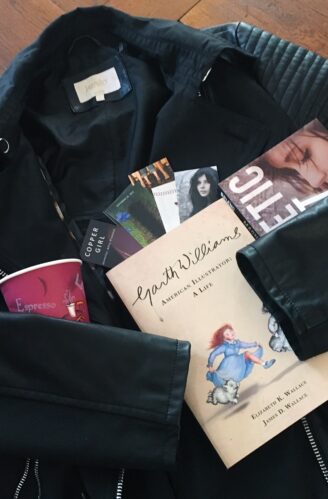Demystifying Publishing (and Finding Sparkly Party Dresses)

I think a lot of people are under the impression that a career in the publishing industry means reading literature for hours on end, meeting charming and clever writers, and discovering the next great American novel. Unfortunately, publishing isn’t all sipping fancy lattes and perusing brilliant submissions. Like any job, there are highs and lows. (Lows: spreadsheets. Highs: reading submissions). As an intern with Beaufort Books and Spencer Hill Press, I am given projects in many areas of the publishing world, so I’m here to give you some insider info on the ups and downs of an internship in this industry.
As an intern in publishing, you will have to power through some duller projects projects wherein Microsoft Excel and Google Sheets will become some of your most familiar friends. At Beaufort and Spencer Hill, I have sifted through binders and spreadsheets to catalogue payments, packed countless boxes, and scanned and re-filed endless contracts. These projects don’t often require a whole lot of creative thought and can be a bit dull, but over the months that I have interned I have been able to see their impact on our office and our authors.
My favorite intern tasks are taking photos for our social media accounts, maintaining the website, and (of course) reviewing submissions. With these projects, I get to flex my creative muscle and see myself making a more direct contribution to our companies: a well-composed photo on instagram, a neater and more effective website, and submissions getting nudged along to our editors.
Although the bulk of my work is less-than-romantic, every project I am given connects to creativity. If I am cataloging payments, that means that people are getting paid to do their dream jobs. If I am packing boxes, that means that our sales teams are able to get books into book stores and into the hands of readers. If I am filing contracts, then we are going to be able to liaise more easily and be more effective in our distribution of all kinds of books.
Aside from interning at Beaufort and Spencer Hill two days a week, I work part-time at a resale clothing store. An intern’s gotta eat, right? At my retail job, there are certainly boring projects: hanging clothes, printing tags for new merchandise sent from corporate, and (ugh) organizing the dreaded purse wall. But, my responsibilities also include buying in clothing from customers looking to sell to us and creating a lot of the store’s visual displays.
As I’ve been gaining confidence in both my position here at Beaufort and Spencer Hill and at my retail job, I’ve been seeing parallels between my creative duties at both workplaces. Buying clothing feels like reviewing submissions. Because I am only an intern here and I am still in training as a buyer at my retail job, my input on submissions and clothing buys is valued, but is only preliminary. It doesn’t take long for me to figure out how I feel about a submission – sometimes within the first few pages it is clear whether or not I would give a manuscript a thumbs up or down. Things as simple as grammar, spelling, and sentence flow can take a manuscript pretty far. For clothing, grammar is to good condition as sentence flow is to trendiness; it doesn’t take long when looking at a garment to determine if it will sell. Broken zipper? No thank you. Underarm wear? I’m gonna have to pass this one back to you. But oh, a sparkly party dress perfect for New Years Eve? I’d be happy to take that one off of your hands. When reviewing manuscripts, I look for the sparkly party dress of submissions: something compelling that draws me in that is in good enough condition to suggest passing along.
Publishing may not be as romantic a world as is commonly thought, but without doing the work of organizing W-9 forms or scanning contracts, there would be no foundation from which we would be able to build to publishing those eye-catching sparkly party dresses.
—Mallory, intern
*This is a shared blog post for Beaufort Books and Spencer Hill Press.
< Previous Post Next Post >